Anne Bradstreet and Phillis Wheatley, two extraordinary poets of the 17th and 18th centuries, left an indelible mark on American literature. Their works, shaped by their unique experiences as women and as voices for the marginalized, continue to resonate today.
Bradstreet, the first published female poet in the American colonies, used her Puritan beliefs and personal experiences to craft poems that explored themes of faith, family, and the challenges of life in the New World. Wheatley, an enslaved African American poet, defied societal norms with her powerful verses that addressed freedom, equality, and spirituality, becoming a symbol of resistance and a voice for the voiceless.
Anne Bradstreet’s Literary Contributions
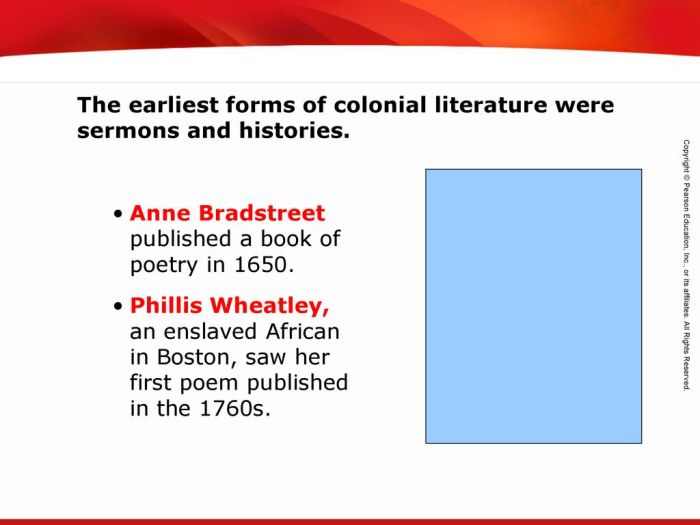
Anne Bradstreet, considered the “mother of American poetry,” made significant contributions to early American literature. Her notable works include:*
-*”The Tenth Muse Lately Sprung Up in America” (1650)
This collection of poems established Bradstreet as the first published female poet in the English colonies.
-*”Contemplations” (1678)
A posthumously published collection of poems that showcased Bradstreet’s maturity and philosophical reflections.
Themes and Style
Bradstreet’s poetry often explored themes of faith, nature, and personal experience. Her style was characterized by:* Use of Puritan beliefs and imagery
- Personal and introspective tone
- Simple, direct language
- Occasional use of rhyme and meter
Puritan Influences
Bradstreet’s Puritan upbringing strongly influenced her writing. She saw poetry as a means to glorify God and explore the complexities of human nature. Her poems often reflect Puritan beliefs about sin, salvation, and the transience of life.
Personal Experiences
Bradstreet also drew inspiration from her own life experiences. Her poems express her struggles with illness, childbirth, and the loss of loved ones. By sharing her personal experiences, she created a unique and relatable voice in American literature.
Phillis Wheatley’s Literary Achievements
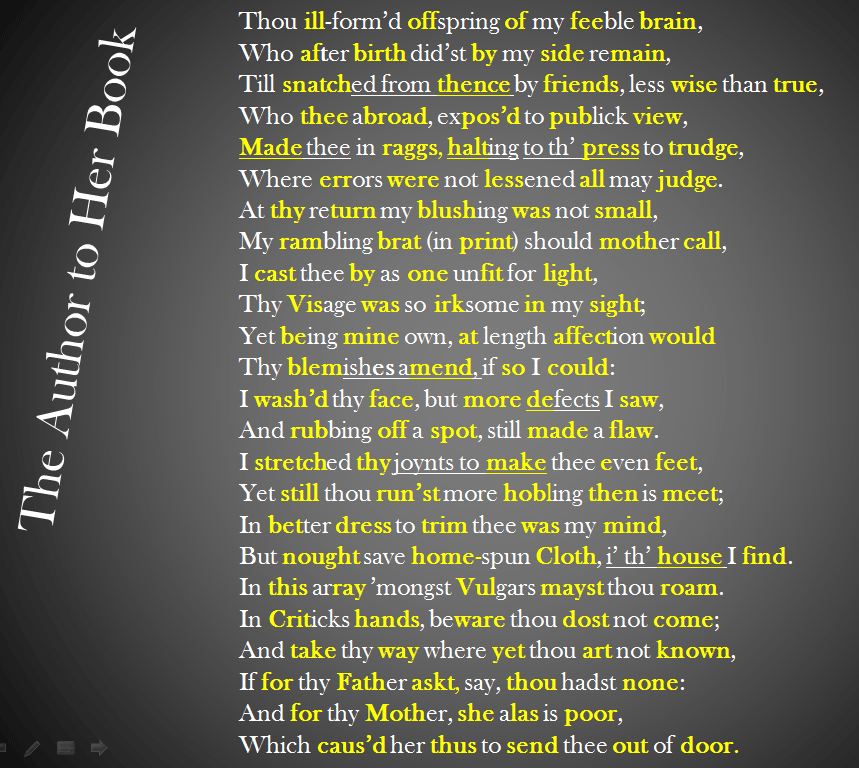
Phillis Wheatley, an enslaved African American poet of the 18th century, overcame significant challenges to become a prominent literary figure. Despite facing the dual oppression of slavery and racism, her remarkable poetic talent and unwavering spirit allowed her to emerge as a voice for the voiceless and a catalyst for social change.Wheatley’s
poems are characterized by their themes of freedom, equality, and spirituality. Through her verses, she eloquently expressed her yearning for liberty and her belief in the inherent dignity of all human beings, regardless of race or social status. Her poems often explored the complexities of her own identity as an enslaved woman and her longing for a world free from oppression.
Her Influence on the Abolitionist Movement
Wheatley’s literary achievements played a pivotal role in the abolitionist movement. Her poems gained widespread recognition and helped to shape public opinion on the issue of slavery. Her work exposed the horrors of the slave trade and challenged the prevailing racist attitudes of the time.
By giving voice to the experiences and aspirations of enslaved people, Wheatley became a powerful advocate for their cause and contributed significantly to the growing momentum for abolition.
Comparison of Writing Styles and Themes
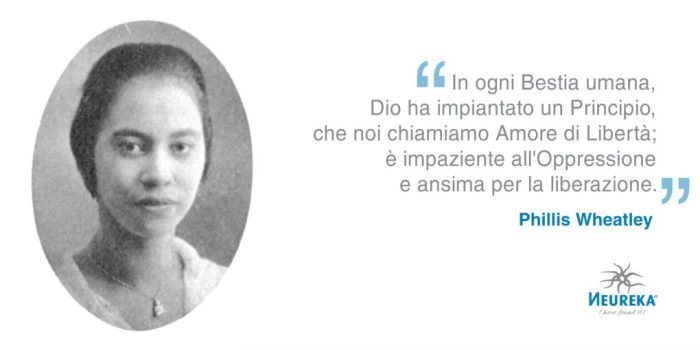
Anne Bradstreet and Phillis Wheatley, two notable figures in American literature, shared common ground in their exploration of profound themes while exhibiting distinct writing styles.
Use of Language and Imagery
Bradstreet employed a more formal, introspective style, characterized by complex syntax and intricate imagery drawn from nature and religion. In contrast, Wheatley’s language was more straightforward and direct, often employing vivid metaphors and allusions to classical literature and mythology.
Structure and Form
Bradstreet’s works often adhered to traditional poetic forms, such as sonnets and quatrains. Her poems frequently exhibited a clear structure, with a discernible beginning, middle, and end. Wheatley, on the other hand, was more experimental in her use of form, often blending different genres and styles within a single work.
Major Themes
Both Bradstreet and Wheatley explored themes of religion, identity, and social justice. Bradstreet’s Puritan faith heavily influenced her work, which often grappled with themes of sin, salvation, and the complexities of human nature. Wheatley’s experiences as an enslaved African woman shaped her poetry, which frequently addressed issues of race, freedom, and the search for self-expression.
Historical Context and Cultural Impact
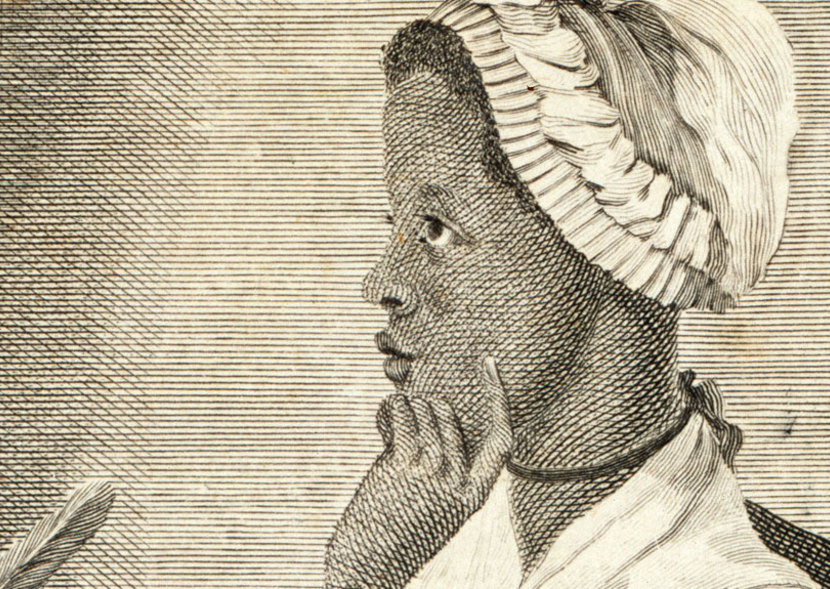
Anne Bradstreet and Phillis Wheatley lived in vastly different historical periods, each marked by distinct cultural and social factors that profoundly influenced their writing and reception.
Anne Bradstreet: Puritan New England
Bradstreet lived in the 17th century, during the era of Puritanism in New England. The Puritan worldview emphasized the sovereignty of God, the depravity of humanity, and the importance of predestination. This religious context shaped Bradstreet’s writing, which often explored themes of faith, redemption, and the struggle against sin.
Phillis Wheatley: The Age of Enlightenment
Wheatley, on the other hand, lived in the 18th century, during the Age of Enlightenment. This period was characterized by a belief in reason, progress, and the power of human potential. Wheatley’s writing reflects these Enlightenment ideals, as she celebrated the beauty of nature, the power of education, and the equality of all people.
Impact on American Literature and Identity
Both Bradstreet and Wheatley made significant contributions to the development of American literature and the shaping of American identity. Bradstreet was one of the first American poets to publish her work, and her writings helped to establish a literary tradition in the New World.
Wheatley was the first African American poet to achieve international acclaim, and her work challenged the prevailing stereotypes of her time.
Together, Bradstreet and Wheatley’s writing helped to define the American literary landscape and to shape the American understanding of identity, faith, and the human condition.
Legacy and Recognition: Anne Bradstreet And Phillis Wheatley
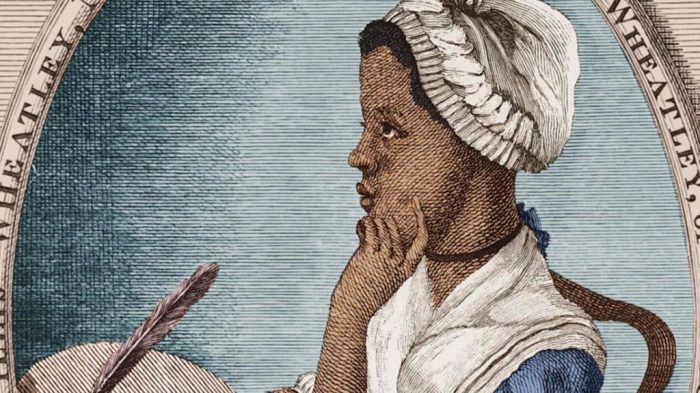
Over time, Anne Bradstreet and Phillis Wheatley have received significant recognition and appreciation for their literary contributions. Their writings have been preserved, studied, and celebrated, solidifying their enduring legacy as influential figures in American literature and history.
Preservation and Study
Bradstreet’s and Wheatley’s works have been carefully preserved and studied by scholars and literary enthusiasts. Bradstreet’s “The Tenth Muse Lately Sprung Up in America” was reprinted multiple times during her lifetime, and her work continues to be anthologized and studied in contemporary literature courses.
Similarly, Wheatley’s poems have been widely published and analyzed, with her “Poems on Various Subjects, Religious and Moral” being recognized as a significant contribution to early American literature.
Critical Acclaim and Awards, Anne bradstreet and phillis wheatley
Both Bradstreet and Wheatley have received critical acclaim and prestigious awards for their literary achievements. Bradstreet was hailed as the “First American Poet” and her work has been praised for its depth of emotion, religious themes, and use of literary devices.
Wheatley, on the other hand, was the first African American woman to publish a book of poetry, and her work earned her recognition from prominent figures such as George Washington and Benjamin Franklin. She was also awarded an honorary degree from Dartmouth College.
Cultural Impact
The literary contributions of Anne Bradstreet and Phillis Wheatley have had a profound cultural impact. Their writings have shed light on the experiences and perspectives of women and people of color during their respective eras. Bradstreet’s exploration of religious themes and domestic life resonated with Puritan society, while Wheatley’s poetry addressed issues of slavery, race, and the search for freedom.
Both authors have inspired generations of writers and activists, contributing to the development of American literature and culture.
FAQ Corner
What were the major themes explored in Anne Bradstreet’s poetry?
Bradstreet’s poetry often explored themes of faith, family, the challenges of life in the New World, and the role of women in society.
How did Phillis Wheatley’s experiences as an enslaved African American woman influence her poetry?
Wheatley’s experiences gave her a unique perspective on themes of freedom, equality, and spirituality, which she expressed powerfully in her verse.